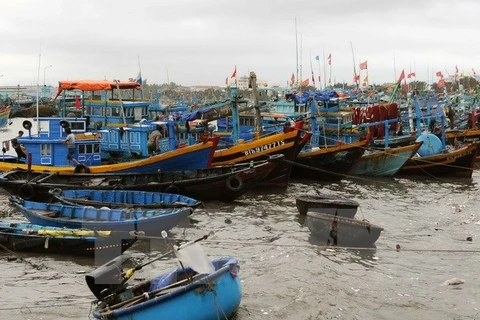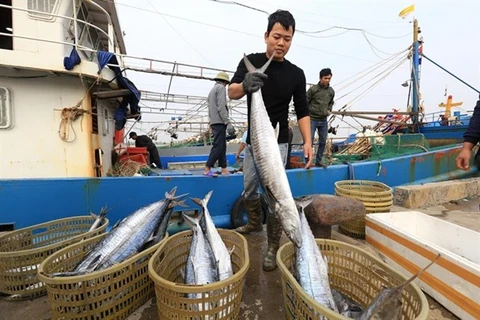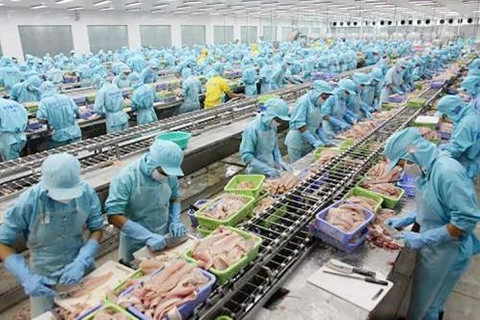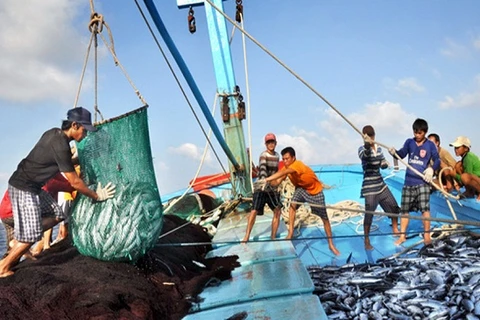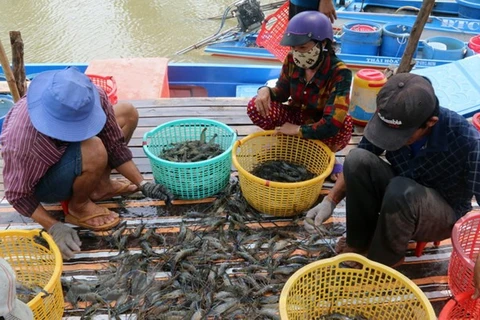Ben Tre (VNA) - Eight Mekong Delta and south central coastal provinces in Vietnam have signed a coordination agreement on the management of fishing vessels in a bid to have the European Commission (EC)’s “yellow card” warning on illegal, unreported, and unregulated (IUU) fishing lifted.
They include the Mekong Delta provinces of Ben Tre, Tien Giang, Tra Vinh, Soc Trang, Bac Lieu, Ca Mau, and Kien Giang; and the south central province of Binh Thuan.
Speaking at a conference in Ben Tre on September 19, Nguyen Chi Quang, deputy commander of the province’s Border Guard Command, said that the signing of the agreement would put measures in place to prevent and resolve fishing boats and their crew committing violations when operating on the provincial waters involved.
The agreement also aimed to put an end to illegal fishing and work towards the removal of the EC’s yellow card warning on Vietnamese seafood.
According to Quang, besides information exchanges, the participating provinces will coordinate to educate the public on the Law on Fisheries, inspect fishing boats and crew members and address violations.
Vice Chairman of the provincial Ben Tre People’s Committee Nguyen Huu Lap said that the eight provinces are home to 31,133 fishing vessels, including 14,114 offshore boats.
Most of them have abided by the laws of Vietnam and surrounding countries. However, some fishermen have been fishing illegally in foreign waters for greater economic gains.
Prior to the EC’s warning, none of the involved provinces had mechanisms in place to coordinate and exchange information, making it difficult to prevent and deal with IUU fishing.
Luu Van Huy, Director of the Vietnam Fisheries Resource Surveillance, said there are some 109,000 fishing boats nationwide, including 28,600 offshore boats, with last year’s catch reaching some 3.2 million tonnes of fish.
However, according to Huy, the rapid increase in the number of fishing boats compared with the current fishery resources has created a negative impact, particularly with local fishing boats operating in foreign waters.
As many as 95 illegal fishing cases involving 156 boats have been reported since the beginning of the year. Many of these cases involve fishing boats from Binh Thuan, Tien Giang, Ben Tre, Bac Lieu, Kien Giang, and Ca Mau.
As such, the coordination among these localities has significantly improved and is now in line with the recommendations of the European Union, Huy said.
The EC issued a yellow card warning to Vietnam last year, after the country failed to demonstrate sufficient progress in the fight against IUU fishing worldwide. While the measure was only considered a warning, which should not technically affect the EC’s trade policy, the Vietnamese fishing industry was concerned that the yellow card would seriously harm the reputation of Vietnamese seafood worldwide, and thus weaken sales.
To address IUU fishing activities, the EC evaluates exporting countries. Countries that fail to meet EC standards are issued a “yellow card” warning, followed by a “green card” if issues are resolved or a “red card” if they are not. A red card can lead to a trade ban on fishery products.
According to the EC’s requirements, the Vietnamese fisheries sector had to implement nine recommendations in six months from October 23, 2017 through until April 23, 2018.
The EC also wanted Vietnam to issue sanctions and increase the level of sanctions against IUU fishing, which should be written in the revised Law on Fisheries, and give concrete evidence proving Vietnam’s efforts in the fight against IUU fishing.
A working delegation from the EC’s General Directorate for Maritime Affairs and Fisheries visited Vietnam from May 16-24 to inspect the country’s implementation of these recommendations. However, Vietnam failed to carry out all nine recommendations well.
The EC inspectors will return to Vietnam in January 2019 to review the country’s progress in addressing its yellow card warnings.–VNA
They include the Mekong Delta provinces of Ben Tre, Tien Giang, Tra Vinh, Soc Trang, Bac Lieu, Ca Mau, and Kien Giang; and the south central province of Binh Thuan.
Speaking at a conference in Ben Tre on September 19, Nguyen Chi Quang, deputy commander of the province’s Border Guard Command, said that the signing of the agreement would put measures in place to prevent and resolve fishing boats and their crew committing violations when operating on the provincial waters involved.
The agreement also aimed to put an end to illegal fishing and work towards the removal of the EC’s yellow card warning on Vietnamese seafood.
According to Quang, besides information exchanges, the participating provinces will coordinate to educate the public on the Law on Fisheries, inspect fishing boats and crew members and address violations.
Vice Chairman of the provincial Ben Tre People’s Committee Nguyen Huu Lap said that the eight provinces are home to 31,133 fishing vessels, including 14,114 offshore boats.
Most of them have abided by the laws of Vietnam and surrounding countries. However, some fishermen have been fishing illegally in foreign waters for greater economic gains.
Prior to the EC’s warning, none of the involved provinces had mechanisms in place to coordinate and exchange information, making it difficult to prevent and deal with IUU fishing.
Luu Van Huy, Director of the Vietnam Fisheries Resource Surveillance, said there are some 109,000 fishing boats nationwide, including 28,600 offshore boats, with last year’s catch reaching some 3.2 million tonnes of fish.
However, according to Huy, the rapid increase in the number of fishing boats compared with the current fishery resources has created a negative impact, particularly with local fishing boats operating in foreign waters.
As many as 95 illegal fishing cases involving 156 boats have been reported since the beginning of the year. Many of these cases involve fishing boats from Binh Thuan, Tien Giang, Ben Tre, Bac Lieu, Kien Giang, and Ca Mau.
As such, the coordination among these localities has significantly improved and is now in line with the recommendations of the European Union, Huy said.
The EC issued a yellow card warning to Vietnam last year, after the country failed to demonstrate sufficient progress in the fight against IUU fishing worldwide. While the measure was only considered a warning, which should not technically affect the EC’s trade policy, the Vietnamese fishing industry was concerned that the yellow card would seriously harm the reputation of Vietnamese seafood worldwide, and thus weaken sales.
To address IUU fishing activities, the EC evaluates exporting countries. Countries that fail to meet EC standards are issued a “yellow card” warning, followed by a “green card” if issues are resolved or a “red card” if they are not. A red card can lead to a trade ban on fishery products.
According to the EC’s requirements, the Vietnamese fisheries sector had to implement nine recommendations in six months from October 23, 2017 through until April 23, 2018.
The EC also wanted Vietnam to issue sanctions and increase the level of sanctions against IUU fishing, which should be written in the revised Law on Fisheries, and give concrete evidence proving Vietnam’s efforts in the fight against IUU fishing.
A working delegation from the EC’s General Directorate for Maritime Affairs and Fisheries visited Vietnam from May 16-24 to inspect the country’s implementation of these recommendations. However, Vietnam failed to carry out all nine recommendations well.
The EC inspectors will return to Vietnam in January 2019 to review the country’s progress in addressing its yellow card warnings.–VNA
VNA

